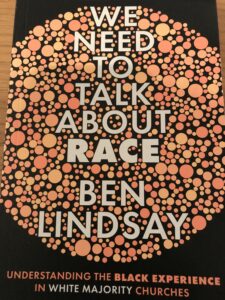Who likes the book?
There’s far too many books to read. So, in most cases, I look comments from others. The reviews for We Need to Talk about Race are from Justin Welby, Krish Kandiah, Andrew Wilson, Les Isaac, and Guvna B, amongst others. These reviews carry weight.
An uncomfortable history
In an ear of ‘cancel or don’t cancel,’ Ben Lindsay honestly looks at the relationship between Churches and slavery (chapter 3). This makes for uncomfortable, yet essential, reading. Although there were Christian abolitionists from the seventeenth century (page 40), this was not unanimous.
More modern history refers to events in the 1950s and 1960s. At the time the vast majority of Churches in the UK were white majority and white-led. And, quoting Justin Welby, Lindsay comments that many arrivals from the British Commonwealth did not receive anything like a warm welcome. Many from African and the Caribbean started their own Churches.
Lindsay carefully explains why economic reparations are unwise (see Jer 31.29-30). He suggests ‘biblical race reparations’ in our thinking and in our Churches. Following Rev Duke Kwon, four elements of such reparations are suggested:
- Changing our vocabulary – look beyond our own ‘white’ understanding and start looking at the Church through the lens of black experience.
- Reckoning with our history – the UK Church must have regular and honest conversations about what has happened in its own history.
- Repentant imagination – the challenge is for white-led, white-majority Churches to have conversations with black members. Imagine, together, who the Church would look like if black people were involved in decision making.
- Less talk, more action – Repair the Church’s view on social and economic issues that affect the black community. And repair broken leadership structures such that they joyfully centre on the gifts of black leaders.
Lessons from Acts 8
Pages 88 & 89 provide a clear explanation of the lessons of this incident in the early Church, where dominant majority culture (Hebrews) ceded authority and decision making to the minority Greek culture. They appointed Greek deacons to make decisions to support the Greek widows in their midst. There was no lowering of standards. The seven chosen were “known to he full of the Spirit and wisdom” (Acts 6.3).
In is important to note that Stephen and Philip, two of ‘the seven,’ developed much wider evangelistic ministry (Acts 7 & 8). The decision by the Hebrew majority to honour the Greek minority in this way had no negative result. Rather it promoted the further growth and expansion of the Church.
Ben Lindsay gives some specific examples which he has witnessed; at Newday (page 89) and the wedding of Harry & Meghan (page 91). Single events may (or may not) make a huge cultural difference; but they are evidence of those seeking to re-balance the inequity and more towards a proper Biblical solution.
